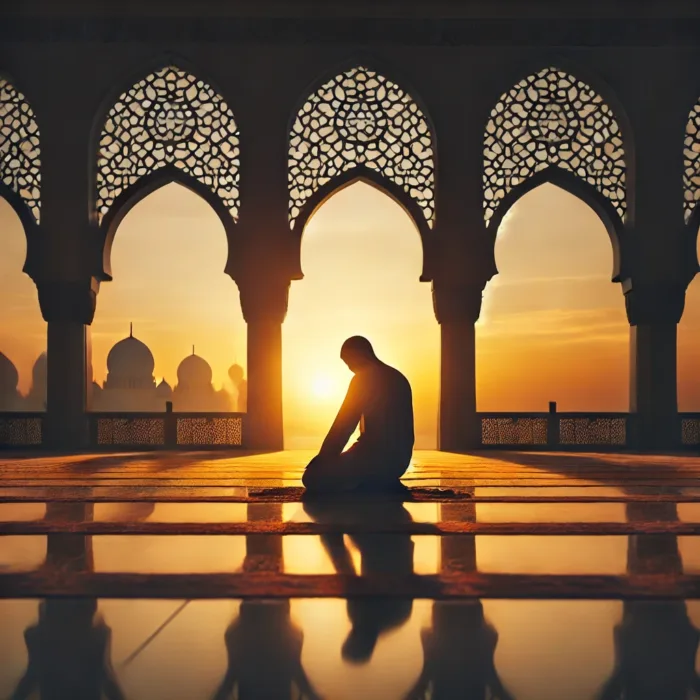Table of Contents
Introduction
This is the twenty-second part in a series of articles that explore prayer in Islam and the correct way it should be performed, following the practices of the righteous predecessors. In this part, we will look into the symbolism of sitting between the two prostrations, the recitations made during the final Tashahhud, the supplications offered after the final Tashahhud and before ending the prayer, and the significance of the remembrances after completing the prayer. If you wish to read the entire series, please Click here, ALLAH willing.
The Symbolism of the Sitting Between the Two Prostrations
After completing the first Sujud, you rise to sit, preparing yourself—as if one prostration alone is not sufficient. This pause before the second Sujud shows that continuous prostration is not possible. We rise, gather ourselves, and then descend again in submission to ALLAH Almighty. In this moment, you sit in the posture of a servant, similar to those who are brought forth for judgment. This is the position that all nations will adopt on the Day of Judgment:
“And you will see every nation kneeling [from fear]…“1
(Suraat ‘Al-Jathiyah, 45:28)
This act of kneeling, descending onto the knees, symbolizes humility and complete submission.
During the sitting between the two prostrations, you sit in a state of humility and surrender, placing your hands in submission before ALLAH Almighty. In this moment, you say, “Rabbi ghfir li, Rabbi ghfir li“2 (LORD, forgive me. My LORD, forgive me).
The phrase “Rabbi ghfir li” during this sitting holds deep significance. It reflects our need to seek forgiveness from ALLAH so that our sins do not stand as barriers to HIS response. These sins are the greatest obstacles that can prevent our prayers from being answered and our hopes from being realized. Therefore, you sincerely repeat, “Rabbi ghfir li, Rabbi ghfir li, Rabbi ghfir li” (LORD, forgive me. My LORD, forgive me. My LORD, forgive me) and you may continue to add to it as your heart desires.
Prolonging the Sitting and Additional Supplications
The Prophet Muhammad, Peace be upon Him, would extend the sitting between the two prostrations, while we, unfortunately, often remain in this position for only a few moments. His sitting was so prolonged that people would sometimes think, “The Prophet Peace be upon Him has forgotten“. Such was the length of his sitting between the two prostrations.

What can we say besides “Rabbi ghfir li” (LORD, forgive me)? We can add, “ALLAHumma ghfir li wa rhamni wa hdini wa jburni wa cafini wa rzuqni wa rfacni“3 (O ALLAH forgive me, have mercy on me, guide me, support me, protect me, provide for me, and elevate me). The Prophet, Peace be upon Him, said:
“Surely, this supplication is better for you in this life and in the Hereafter“4
By reciting these supplications during the sitting between the two prostrations, you secure the blessings of both this world and the hereafter.
The Final Tashahhud and Its Significance
After this, you go into the second Sujud, repeating what you said in the first, feeling the depth of humility and submission. Then you rise for the Tashahhud, beginning with: “‘At-Tahiyyatu liLLAH“5 (All the compliments are for ALLAH). Here, you offer ALLAH Almighty every word of goodness that HE rightfully deserves. “‘At-Tahiyyatu liLLAH wa SSalawaat“6 (All the compliments are for ALLAH and all the prayers), meaning all praise belongs to HIM. “wa TTayibaat“7 (and all the good things (are for ALLAH)), indicating that every pure deed is for ALLAH, as anything impure is not worthy of HIM. We present only what is pure and good to ALLAH.
When you say, “‘As-salaamu ‘Alaika ‘ayyuha nnabiy“8 (Peace be upon You, O Prophet), you sense that you are addressing the Prophet Muhammad, Peace be upon Him, directly. Picture Him entering through a door and standing before you. You see His radiant face, His white garment, His mended sandals, His hand softer than silk, and His face more beautiful than the moon. You say, “‘As-salaamu ‘Alaika ‘ayyuha nnabiy wa rahmatu LLAHi wa barakaatuh“9 (Peace be upon You, O Prophet, and ALLAH’s mercy and blessings (are on You)), feeling His presence as if He is truly there. The Prophet said that whenever someone sends peace upon Him, ALLAH returns His soul to Him so He can respond to the greeting.
Then you say, “‘As-salaamu ‘alaina wa ‘ala ‘ibaadi LLAHi SSaalihiin“10 (And peace be on us and on the good (pious) worshipers of ALLAH). With these words, your greeting extends to every righteous servant in the heavens and the earth—the Prophets, messengers, those who have passed away, and those who are still alive. In this moment, you have greeted them all and earned their collective rewards. Think of what is missed by those who do not grasp these deep meanings in the Tashahhud.
“‘Ash-hadu ‘an laa ‘ilaaha ‘illa LLAH wa ‘ash-hadu ‘anna Muhammad ‘abduhu wa rassuluh“11 (I testify that none has the right to be worshipped but ALLAH and that Muhammad is HIS Slave and Apostle). Here, you feel the essence of sincerity and pure monotheism, echoing the devotion in “It is YOU we worship and YOU we ask for help“12. Next, you send blessings upon the Prophet:
“‘ALLAHumma SSalli ‘alaa Muhammadin wa ‘alaa ‘aali Muhammadin kamaa Sallayta ‘alaa ‘Ibraahiim wa ‘alaa ‘aali ‘Ibraahiim ‘innaka hamiidun majiid, ‘ALLAHumma baarik ‘alaa Muhammadin wa ‘alaa ‘aali Muhammadin kamaa baarakta ‘alaa ‘Ibraahiim wa ‘alaa ‘aali ‘Ibraahiim ‘innaka hamiidun majiid“13
(O ALLAH, send YOUR grace, honour and mercy upon Muhammad and upon the family of Muhammad, as YOU sent YOUR grace, honour and mercy upon Ibrahim and upon the family of Ibrahim, YOU are indeed Praiseworthy, Most Glorious. O ALLAH, send blessings upon Muhammad and upon the family of Muhammad as YOU sent blessings upon Ibrahim and the family of Ibrahim, YOU are Praiseworthy, Most Glorious)
Supplications After the Tashahhud and Before Concluding the Prayer
At this moment, you recite the four supplications—or five, as mentioned in some narrations—that mark the conclusion of your prayer. Supplication at this point is accepted and carries special significance. After the Tashahhud and before the Tasleem (the final salutation), your prayers hold great power. You recite the supplications taught by the Prophet, Peace be upon Him:
“‘ALLAHumma ‘inni a’uudhu bika min ‘adhaabi lqabr wa a’uudu bika min fitnati lmassiihi ddajjaal wa a’uudu bika min fitnati lmahyaa wa lmamaat, ALLAHuma ‘inni a’uudu bika mina lma’thami wa lmaghram“14
(O ALLAH, I seek refuge with YOU from the punishment of the grave, from the afflictions of the imposter- Messiah, and from the afflictions of life and death. O ALLAH, I seek refuge with YOU from sins and from debt)
Sin refers to instances where a person may commit wrongdoing, while debt represents situations of financial burden or loss. You can also ask for whatever good you wish, both in this world and in the hereafter, for ALLAH has opened HIS doors to you. If your prayer is performed with sincerity and excellence, rejoice in the increased acceptance of your supplications and the generosity of ALLAH’s response. Do not miss this valuable moment to make supplication to ALLAH. Finally, you turn your head to the right, saying “‘assalamu ‘alaykum wa rahmatu LLAH” (Peace be upon you and ALLAH’s mercy (are on you)), and then to the left, completing your prayer.

Out of respect for ALLAH, do not rush to leave as if you were in a hurry. Stay and engage in the remembrances. Some scholars refer to this time after the prayer as “the precious sitting“, as it is a moment when ALLAH forgives sins. The Prophet, Peace be upon Him, said:
“The angels keep on asking ALLAH’s forgiveness for anyone of you, as long as he is at his Musalla (praying place) and he does not pass wind (Hadath). They say, ‘O ALLAH! Forgive him, O ALLAH! be Merciful to him“15
So, sit and say, “‘Astaghfiru LLAH, ‘Astaghfiru LLAH, ‘Astaghfiru LLAH” (I seek forgiveness from ALLAH. I seek forgiveness from ALLAH. I seek forgiveness from ALLAH), because no matter how well you performed this prayer, it can never truly match the majesty of ALLAH. No matter how much effort and care you put into it, ALLAH is deserving of even more. You may not realize how much your mind may have wandered or how distracted you may have been during the prayer. So, you seek forgiveness from ALLAH and then continue with the rest of the remembrances after the prayer.
In doing so, we start to cultivate humility in our prayer and build deeper connections. The matter goes even beyond this; the deeper one engages in prayer, the more one feels its sweetness, joy, and beauty. Prayer has a unique beauty and taste that only those who sincerely immerse themselves in it can experience. Don’t be satisfied with just hearing about it—try for yourself, once, twice, and again until you truly feel it. Those who taste it, know it; and those who know it, draw from its blessings abundantly. ALLAH is the One whose help is sought, and all praise is due to ALLAH, LORD of the worlds.
Sources:
- Dr. Ahmed ElAraby. فاهم 36 | سلسلة تذوق العبادات – (1) الصلاة | مع د. أحمد العربي. YouTube Video.
- Saheeh International translation ↩︎
- Sunan Abi Dawud ↩︎
- Sunan Abi Dawud ↩︎
- Sahih Muslim ↩︎
- Sahih Al-Bukhari ↩︎
- Sahih Al-Bukhari ↩︎
- Sahih Al-Bukhari ↩︎
- Sahih Al-Bukhari ↩︎
- Sahih Al-Bukhari ↩︎
- Sahih Al-Bukhari ↩︎
- Sahih Al-Bukhari ↩︎
- Saheeh International translation ↩︎
- Sahih Al-Bukhari ↩︎
- Sahih Al-Bukhari ↩︎
- Sahih Al-Bukhari ↩︎

